Abstract
This study was designed to investigate the role of dopaminergic mechanisms in the control of aldosterone secretion in man. Five normal male subjects in metabolic balance at 150 meq sodium/d and 60 meq potassium/d constant intake received the specific dopamine antagonist, metoclopramide, 10 mg i.v. on 2 consecutive d. On the 1st d, the subjects received an infusion of 5% glucose solution (vehicle) from 60 min before to 60 min after metoclopramide administration; on the 2nd d, an infusion of dopamine 4 μg/kg per min was substituted for vehicle. Metoclopramide in the presence of vehicle increased plasma aldosterone concentrations from 2.4±1.1 to a maximum of 17.2±2.8 ng/100 ml (P < 0.01) and serum prolactin concentrations from 7.5±5.0 to a maximum of 82.2±8.7 ng/ml (P < 0.01). Dopamine 4 μg/kg per min did not alter basal plasma aldosterone concentrations, but blunted the aldosterone responses to metoclopramide significantly; in the presence of dopamine, plasma aldosterone concentrations increased from 3.1±0.5 to 6.2±1.4 ng/100 ml (P < 0.05) in response to metoclopramide. The incremental aldosterone responses to metoclopramide were significantly lower in the presence of dopamine than with vehicle. Dopamine 4 μg/kg per min suppressed basal prolactin to <3 ng/ml and inhibited the prolactin responses to metoclopramide; serum prolactin concentrations increased to a maximum of 8.5±2.3 ng/ml with metoclopramide in the presence of dopamine.
The subjects were studied in the same manner except that dopamine 2 μg/kg per min was administered instead of the 4-μg/kg per min dose. Dopamine 2 μg/kg per min attenuated the aldosterone and prolactin responses to metoclopramide, but was less effective than the 4-μg/kg per min dose of dopamine.
Metoclopramide 10 mg i.v. was administered to five additional subjects after pretreatment with the dopamine agonist, bromocriptine, 2.5 mg or placebo at 6 p.m., midnight, and 6 a.m. before study. Bromocriptine suppressed basal serum prolactin levels and completely inhibited the prolactin responses to metoclopramide. In contrast, bromocriptine did not alter basal plasma aldosterone concentrations or the aldosterone responses to metoclopramide. Plasma renin activity, plasma cortisol, and serum potassium concentrations were unchanged by metoclopramide, dopamine, or bromocriptine.
The results of this study suggest that the aldosterone response to metoclopramide is mediated by metoclopramide's antagonist activity at the dopamine receptor level. The results further suggest dissociation of the responses to the dopamine agonists, dopamine and bromocriptine, and indicate that a new type of dopamine receptor may inhibit aldosterone secretion.
Full text
PDF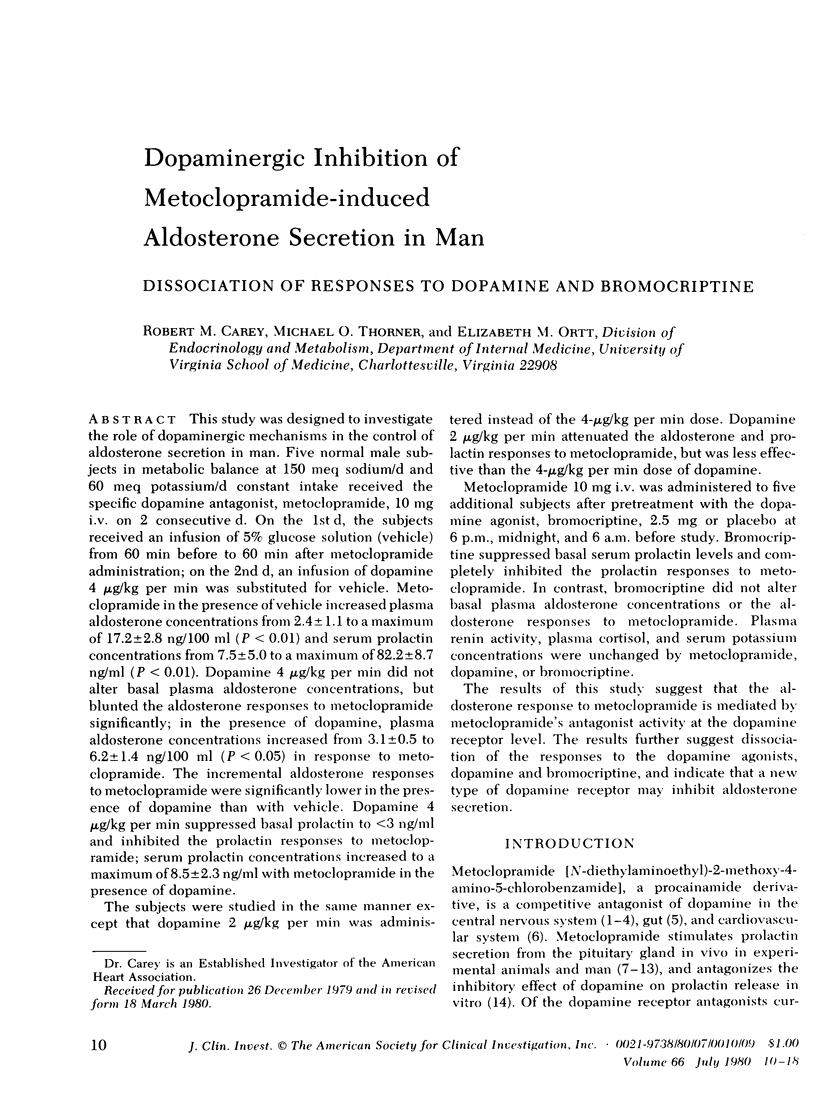
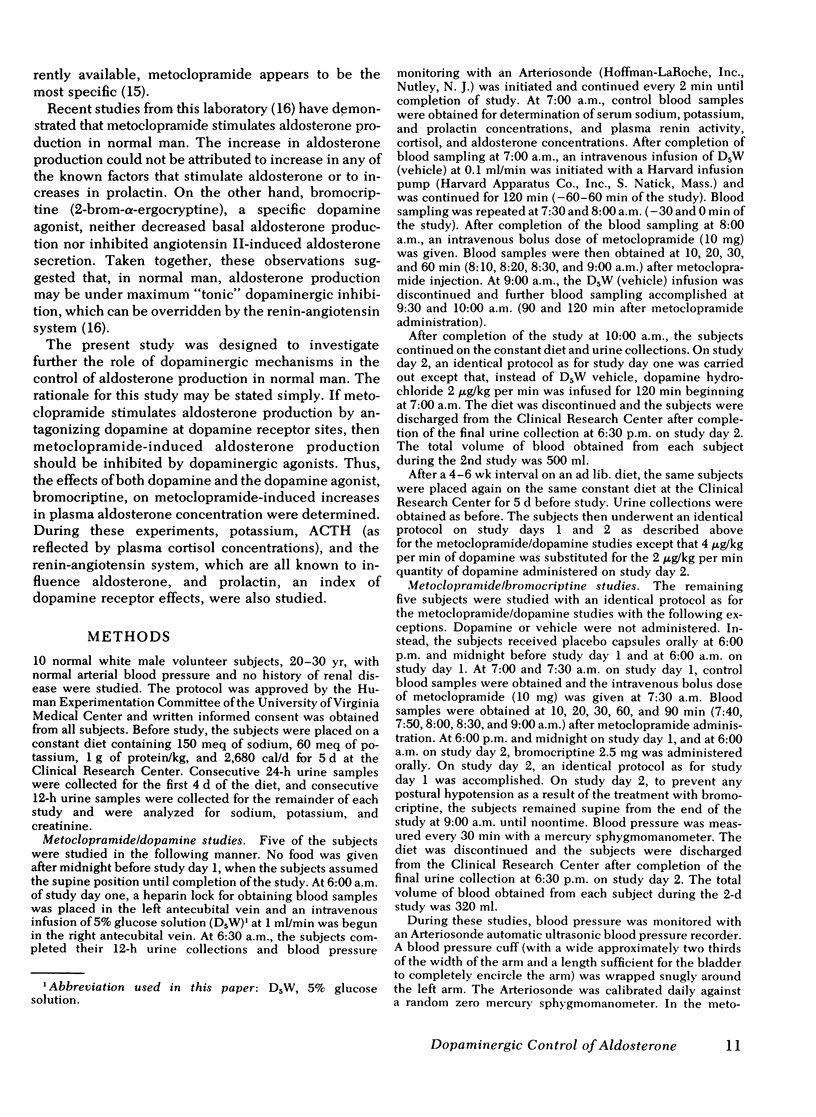
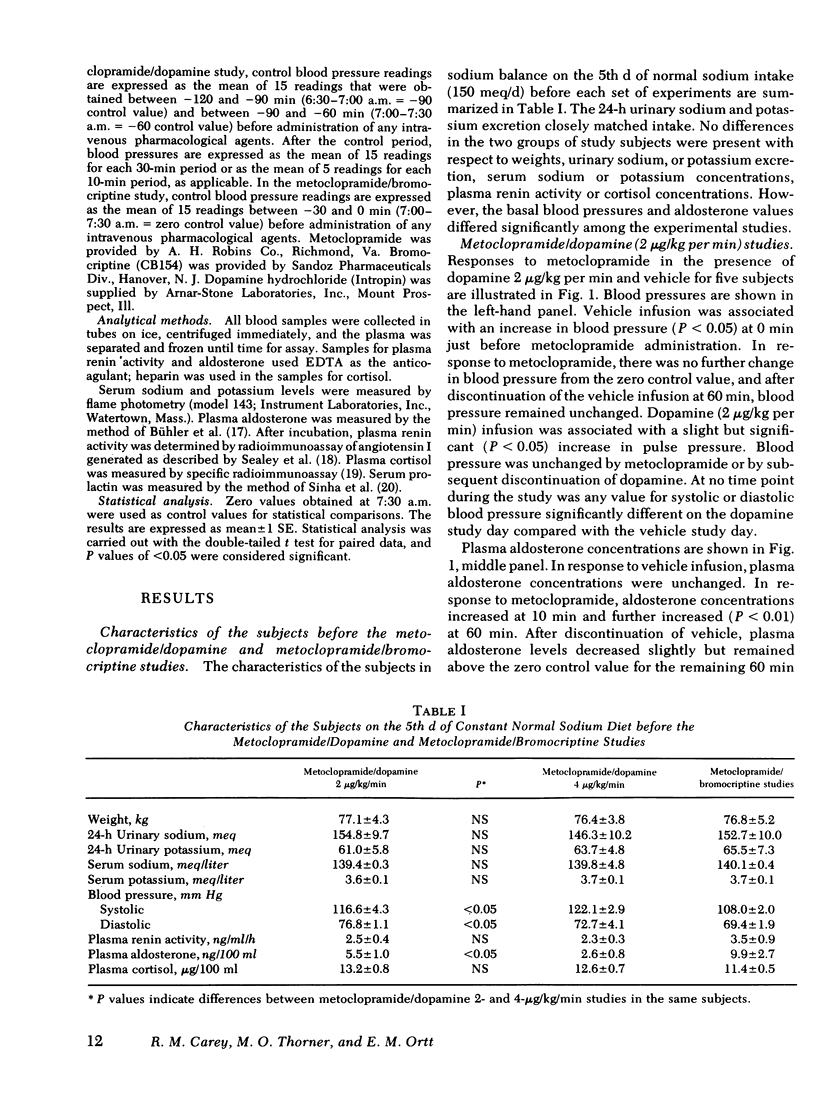
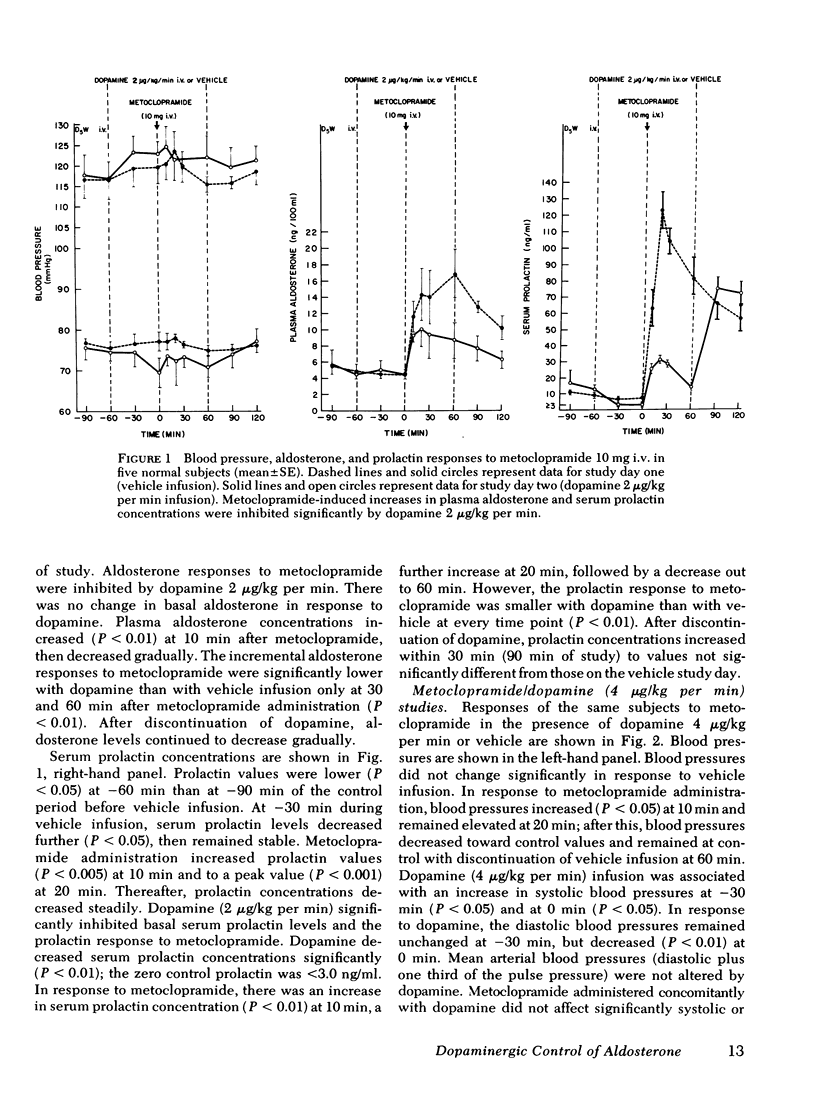
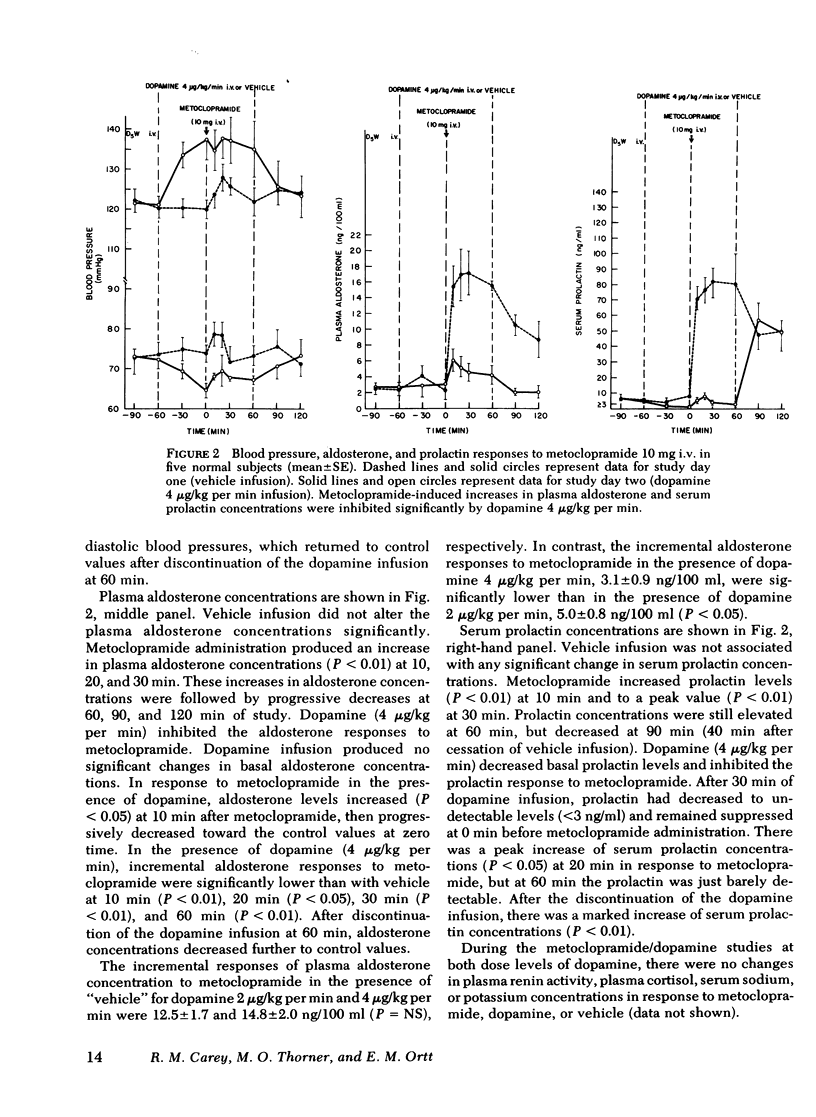
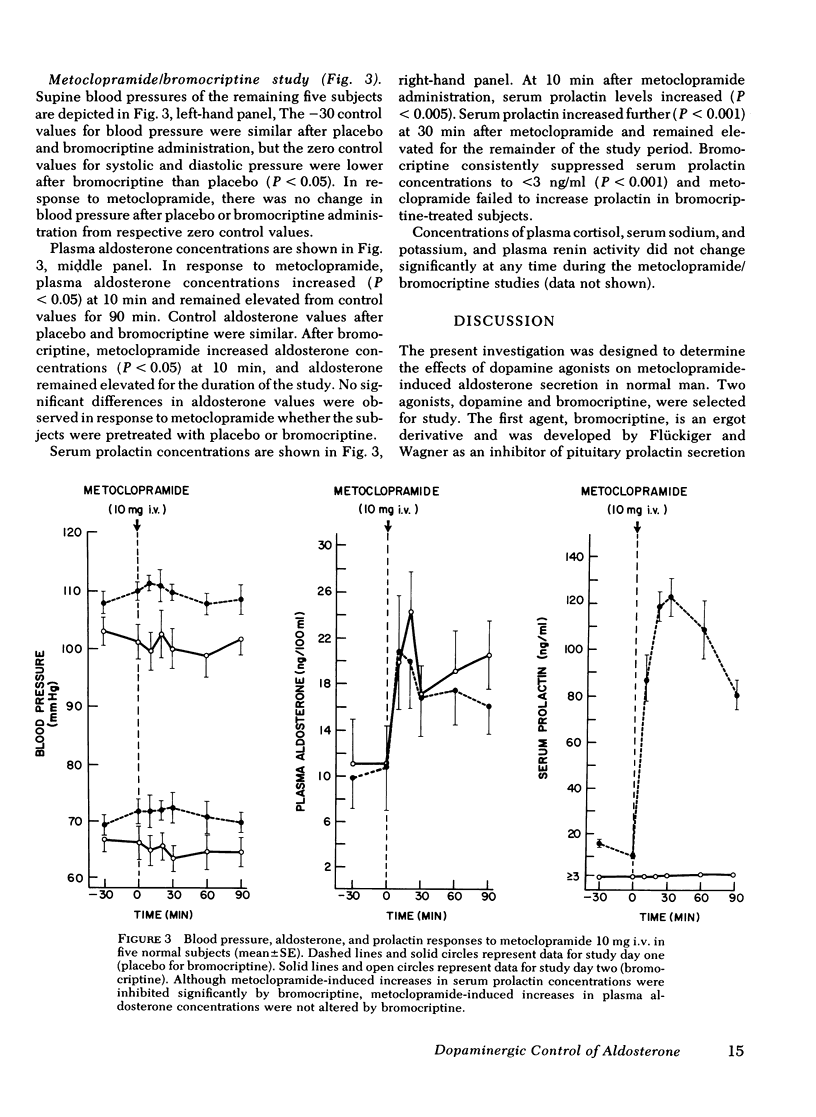
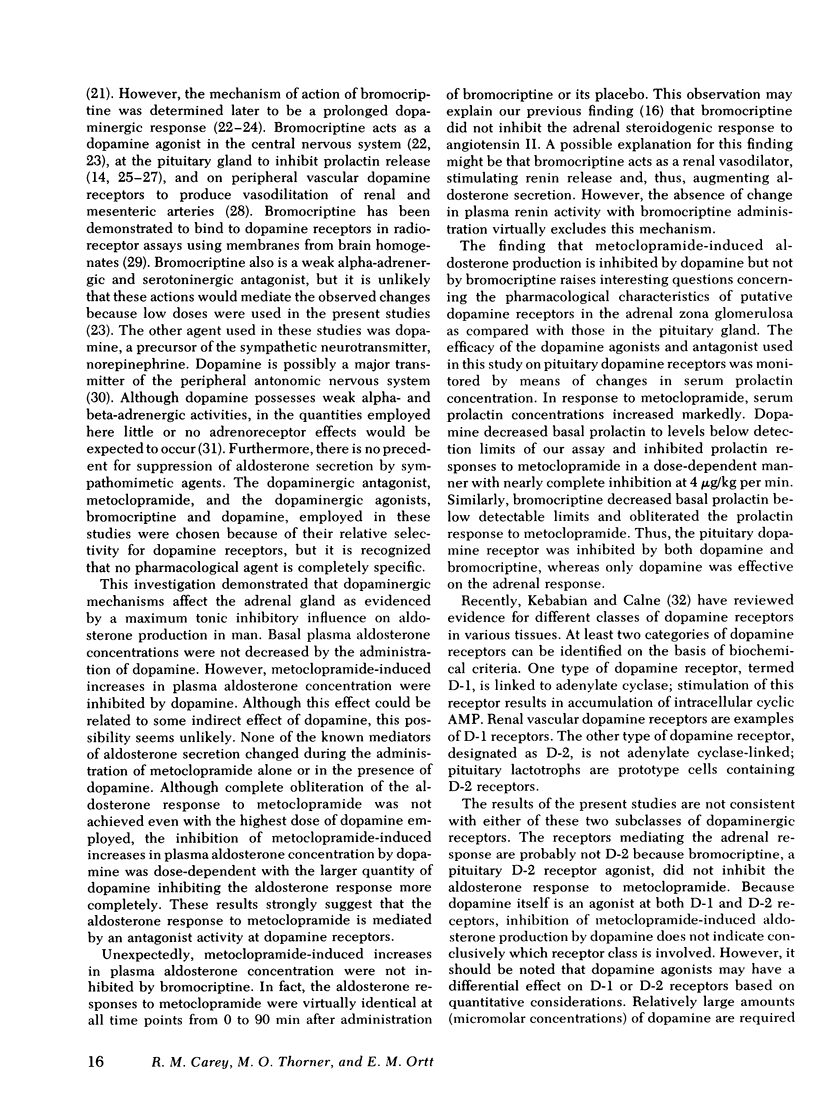
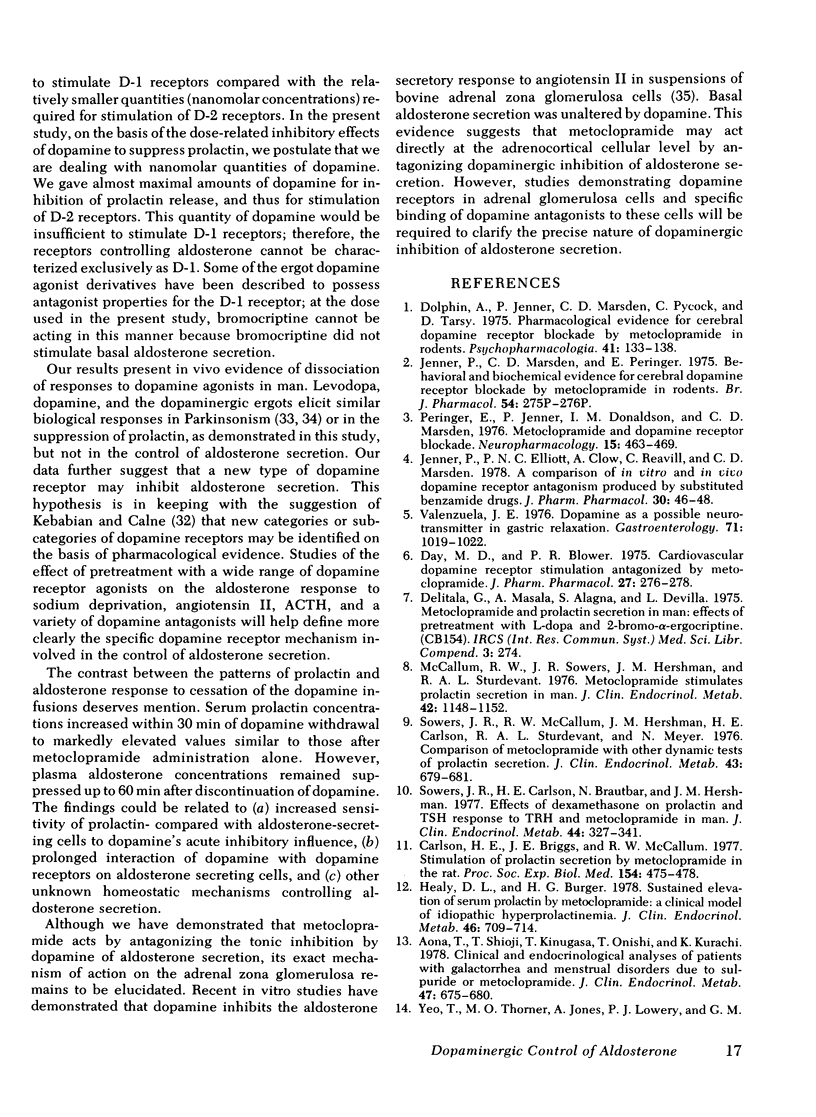
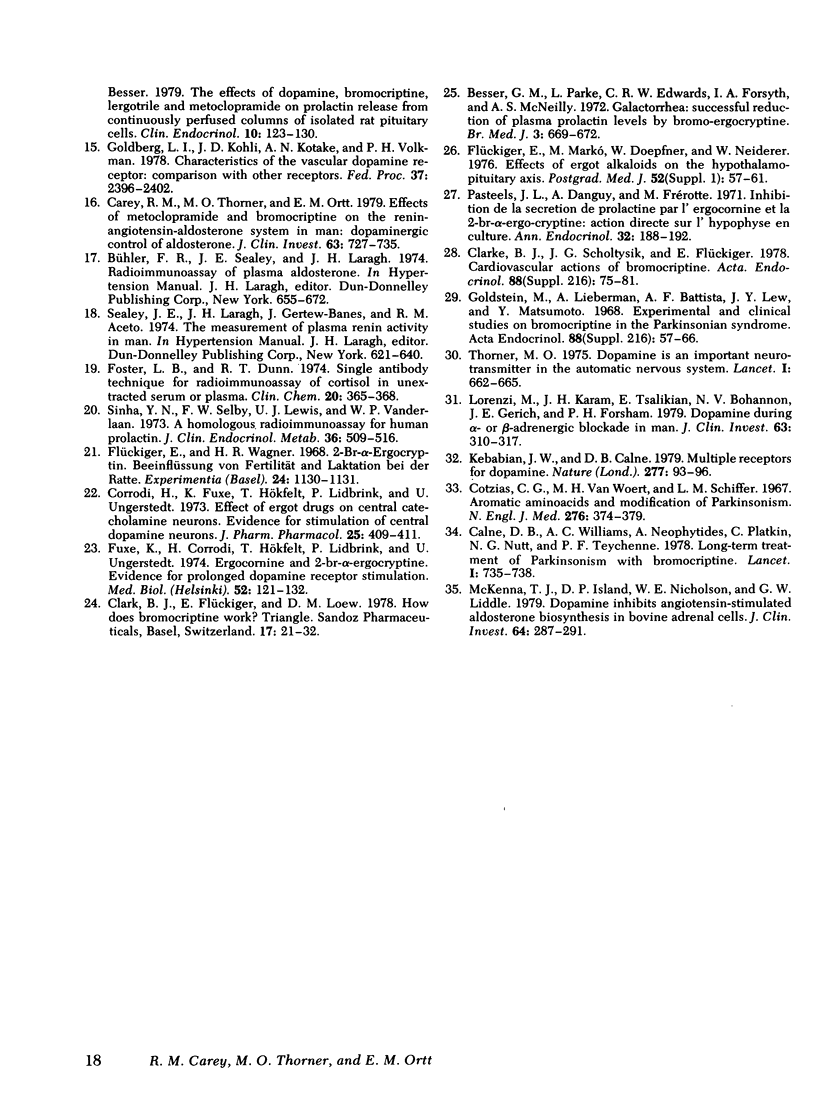
Selected References
These references are in PubMed. This may not be the complete list of references from this article.
- Aono T., Shioji T., Kinugasa T., Onishi T., Kurachi K. Clinical and endocrinological analyses of patients with galactorrhea and menstrual disorders due to sulpiride or metoclopramide. J Clin Endocrinol Metab. 1978 Sep;47(3):675–680. doi: 10.1210/jcem-47-3-675. [DOI] [PubMed] [Google Scholar]
- Besser G. M., Parke L., Edwards C. R., Forsyth I. A., McNeilly A. S. Galactorrhoea: successful treatment with reduction of plasma prolactin levels by brom-ergocryptine. Br Med J. 1972 Sep 16;3(5828):669–672. doi: 10.1136/bmj.3.5828.669. [DOI] [PMC free article] [PubMed] [Google Scholar]
- Calne D. B., Plotkin C., Williams A. C., Nutt J. G., Neophytides A., Teychenne P. F. Long-term treatment of parkinsonism with bromocriptine. Lancet. 1978 Apr 8;1(8067):735–738. doi: 10.1016/s0140-6736(78)90856-5. [DOI] [PubMed] [Google Scholar]
- Carey R. M., Thorner M. O., Ortt E. M. Effects of metoclopramide and bromocriptine on the renin-angiotensin-aldosterone system in man. Dopaminergic control of aldosterone. J Clin Invest. 1979 Apr;63(4):727–735. doi: 10.1172/JCI109356. [DOI] [PMC free article] [PubMed] [Google Scholar]
- Carlson H. E., Briggs J. E., McCallum R. W. Stimulation of prolactin secretion by metoclopramide in the rat. Proc Soc Exp Biol Med. 1977 Mar;154(3):475–478. doi: 10.3181/00379727-154-39697a. [DOI] [PubMed] [Google Scholar]
- Clark B. J., Scholtysik G., Flückiger E. Cardiovascular actions of bromocriptine. Acta Endocrinol Suppl (Copenh) 1978;216:75–81. [PubMed] [Google Scholar]
- Corrodi H., Fuxe K., Hökfelt T., Lidbrink P., Ungerstedt U. Effect of ergot drugs on central catecholamine neurons: evidence for a stimulation of central dopamine neurons. J Pharm Pharmacol. 1973 May;25(5):409–412. doi: 10.1111/j.2042-7158.1973.tb10037.x. [DOI] [PubMed] [Google Scholar]
- Cotzias G. C., Van Woert M. H., Schiffer L. M. Aromatic amino acids and modification of parkinsonism. N Engl J Med. 1967 Feb 16;276(7):374–379. doi: 10.1056/NEJM196702162760703. [DOI] [PubMed] [Google Scholar]
- Day M. D., Blower P. R. Cardiovascular dopamine receptor stimulation antagonized by metoclopramide. J Pharm Pharmacol. 1975 Apr;27(4):276–278. doi: 10.1111/j.2042-7158.1975.tb10699.x. [DOI] [PubMed] [Google Scholar]
- Delitala G., Masala A., Alagna S., Devilla L. Metaclopramide and prolactin secretion in man: effects of pretreatment with L-dopa and 2-bromo-alpha-ergocryptine (CB-154). IRCS J Med Sci. 1975 Jun;3(6):274–274. [PubMed] [Google Scholar]
- Dolphin A., Jenner P., Marsden C. D., Pycock C., Tarsy D. Pharmacological evidence for cerebral dopamine receptor blockade by metoclopramide in rodents. Psychopharmacologia. 1975;41(2):133–138. doi: 10.1007/BF00421070. [DOI] [PubMed] [Google Scholar]
- Flückiger E., Wagner H. R. 2-Br-alpha-Ergokryptin: Beeinflussung von Fertilität und Laktation bei der Ratte. Experientia. 1968 Nov 15;24(11):1130–1131. doi: 10.1007/BF02147804. [DOI] [PubMed] [Google Scholar]
- Foster L. B., Dunn R. T. Single-antibody technique for radioimmunoassay of cortisol in unextracted serum or plasma. Clin Chem. 1974 Mar;20(3):365–368. [PubMed] [Google Scholar]
- Fuxe K., Corrodi H., Hökfelt T., Lidbrink P., Ungerstedt U. Ergocornine and 2-Br-alpha-ergocryptine. Evidence for prolonged dopamine receptor stimulation. Med Biol. 1974 Apr;52(2):121–132. [PubMed] [Google Scholar]
- Goldberg L. I., Kohli J. D., Kotake A. N., Volkman P. H. Characteristics of the vascular dopamine receptor: comparison with other receptors. Fed Proc. 1978 Aug;37(10):2396–2402. [PubMed] [Google Scholar]
- Goldstein M., Lieberman A., Battista A. F., Lew J. Y., Matsumoto Y. Experimental and clinical studies on bromocriptine in the Parkinsonian syndrome. Acta Endocrinol Suppl (Copenh) 1978;216:57–66. [PubMed] [Google Scholar]
- Healy D. L., Burger H. G. Sustained elevation of serum prolactin by metoclopramide: a clinical model of idiopathic hyperprolactinemia. J Clin Endocrinol Metab. 1978 May;46(5):709–714. doi: 10.1210/jcem-46-5-709. [DOI] [PubMed] [Google Scholar]
- Jenner P., Elliott P. N., Clow A., Reavill C., Marsden C. D. A comparison of in vitro and in vivo dopamine receptor antagonism produced by substituted benzamide drugs. J Pharm Pharmacol. 1978 Jan;30(1):46–48. doi: 10.1111/j.2042-7158.1978.tb13151.x. [DOI] [PubMed] [Google Scholar]
- Jenner P., Marsden C. D., Peringer E. Proceedings: Behavioural and biochemical evidence for cerebral dopamine receptor blockade by metoclopramide in rodents. Br J Pharmacol. 1975 Jun;54(2):275P–276P. [PMC free article] [PubMed] [Google Scholar]
- Kebabian J. W., Calne D. B. Multiple receptors for dopamine. Nature. 1979 Jan 11;277(5692):93–96. doi: 10.1038/277093a0. [DOI] [PubMed] [Google Scholar]
- Lorenzi M., Karam J. H., Tsalikian E., Bohannon N. V., Gerich J. E., Forsham P. H. Dopamine during alpha- or beta-adrenergic blockade in man. Hormonal, metabolic, and cardiovascular effects. J Clin Invest. 1979 Feb;63(2):310–317. doi: 10.1172/JCI109304. [DOI] [PMC free article] [PubMed] [Google Scholar]
- McCallum R. W., Sowers J. R., Hershman J. M., Sturdevant R. A. Metoclopramide stimulates prolactin secretion in man. J Clin Endocrinol Metab. 1976 Jun;42(6):1148–1152. doi: 10.1210/jcem-42-6-1148. [DOI] [PubMed] [Google Scholar]
- McKenna T. J., Island D. P., Nicholson W. E., Liddle G. W. Dopamine inhibits angiotensin-stimulated aldosterone biosynthesis in bovine adrenal cells. J Clin Invest. 1979 Jul;64(1):287–291. doi: 10.1172/JCI109450. [DOI] [PMC free article] [PubMed] [Google Scholar]
- Pasteels J. L., Danguy A., Frérotte M., Ectors F. Inhibition de la sécrétion de prolactine par l'ergocornine et la 2-Br-alpha-ergocryptine: action directe sur l'hypophyse en culture. Ann Endocrinol (Paris) 1971 Jan-Feb;32(1):188–192. [PubMed] [Google Scholar]
- Sinha Y. N., Selby F. W., Lewis U. J., VanderLaan W. P. A homologous radioimmunoassay for human prolactin. J Clin Endocrinol Metab. 1973 Mar;36(3):509–516. doi: 10.1210/jcem-36-3-509. [DOI] [PubMed] [Google Scholar]
- Sowers J. R., McCallum R. W., Hershman J. M., Carlson H. E., Sturdevant R. A., Meyer N. Comparison of metoclopramide with other dynamic tests of prolactin secretion. J Clin Endocrinol Metab. 1976 Sep;43(3):679–681. doi: 10.1210/jcem-43-3-679. [DOI] [PubMed] [Google Scholar]
- Thorner M. O. Dopamine is an important neurotransmitter in the autonomic nervous system. Lancet. 1975 Mar 22;1(7908):662–665. doi: 10.1016/s0140-6736(75)91762-6. [DOI] [PubMed] [Google Scholar]
- Valenzuela J. E. Dopamine as a possible neurotransmitter in gastric relaxation. Gastroenterology. 1976 Dec;71(6):1019–1022. [PubMed] [Google Scholar]
- Yeo T., Thorner M. O., Jones A., Lowry P. J., Besser G. M. The effects of dopamine, bromocriptine, lergotrile and metoclopramide on prolactin release from continuously perfused columns of isolated rat pituitary cells. Clin Endocrinol (Oxf) 1979 Feb;10(2):123–130. doi: 10.1111/j.1365-2265.1979.tb01357.x. [DOI] [PubMed] [Google Scholar]


